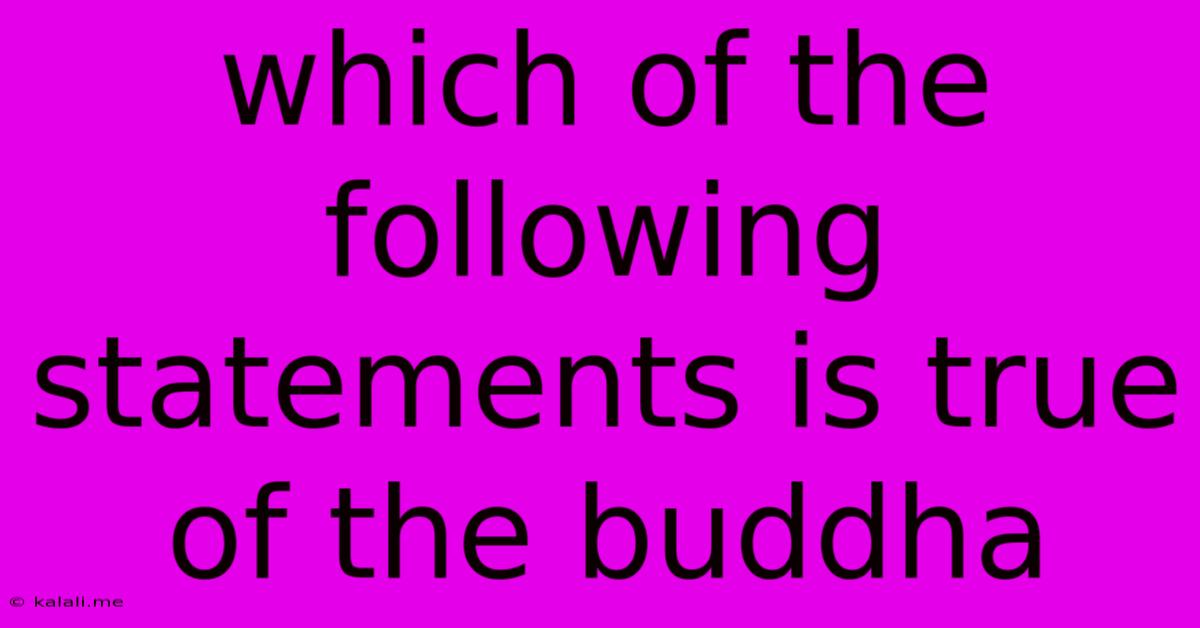Which Of The Following Statements Is True Of The Buddha
Kalali
Jun 13, 2025 · 3 min read

Table of Contents
Which of the Following Statements is True of the Buddha? Deconstructing the Life and Teachings of Siddhartha Gautama
The Buddha, Siddhartha Gautama, remains a figure of immense global influence, inspiring millions through his teachings on suffering, enlightenment, and the path to Nirvana. Understanding his life and philosophy requires careful consideration, separating historical fact from later embellishments. This article aims to clarify common misconceptions and explore the accurate statements regarding the Buddha. We'll examine several potential statements, determining their veracity based on reliable historical and scholarly sources.
Meta Description: Explore the life and teachings of the Buddha. This article examines common statements about Siddhartha Gautama, separating fact from fiction and clarifying misconceptions surrounding his life and philosophies.
Statement 1: The Buddha was a god.
False. While revered by millions and considered enlightened, the Buddha explicitly rejected the idea of a creator god or divine intervention. His teachings emphasized self-reliance, personal effort, and the cultivation of wisdom and compassion through meditation and ethical conduct. The concept of Nirvana, the ultimate goal of Buddhist practice, is achieved through one's own efforts, not through divine grace. Buddhism, particularly Theravada Buddhism, emphasizes self-discovery and the rejection of supernatural explanations for suffering.
Statement 2: The Buddha advocated for extreme asceticism.
Partially True. In his early life, Siddhartha Gautama did engage in extreme ascetic practices, believing that self-mortification would lead to enlightenment. However, he eventually rejected this path, recognizing that it was unproductive and ultimately unhealthy. This pivotal moment marked a shift in his approach, leading to the "Middle Way"—a balanced path avoiding both self-indulgence and extreme deprivation. The emphasis on moderation and mindful living is a core tenet of Buddhist philosophy.
Statement 3: The Buddha's teachings primarily focused on escaping the cycle of reincarnation.
True. Central to Buddhist thought is the concept of samsara, the continuous cycle of birth, death, and rebirth. Suffering is inherent in this cycle, driven by attachment, craving, and ignorance. The Buddha's teachings provided a framework—the Eightfold Path—for escaping this cycle and achieving liberation (Nirvana), a state free from suffering and the cycle of rebirth. This escape isn't about avoiding life but rather understanding its impermanent nature and cultivating wisdom to transcend suffering.
Statement 4: The Buddha established a rigid, hierarchical monastic order.
Partially True. While the Buddha did establish the Sangha, a monastic community, the structure was less rigid than some later interpretations suggest. Early monastic life emphasized simplicity, equality (among monks), and a focus on meditation and ethical conduct. Over time, however, the Sangha evolved, developing hierarchical structures and varying traditions across different schools of Buddhism. The initial emphasis was on personal practice and the dissemination of the Buddha's teachings, not on a strict organizational hierarchy.
Statement 5: The Buddha's teachings are solely confined to meditation and mindfulness.
False. While meditation and mindfulness are crucial practices within Buddhism, they form only part of the broader teachings. The Buddha's philosophy encompasses ethics (sila), meditation (samadhi), and wisdom (prajna), often referred to as the "Three Trainings." Right understanding, right thought, right speech, right action, right livelihood, right effort, right mindfulness, and right concentration—the Eightfold Path—cover a wide range of aspects of life, encompassing ethical conduct, mental discipline, and wisdom. These elements are interconnected and work together towards the goal of liberation.
Understanding the Buddha’s life and teachings requires critical analysis and a nuanced understanding of historical context. By examining these common statements, we gain a clearer picture of the complexities of Buddhism and the enduring legacy of Siddhartha Gautama.
Latest Posts
Latest Posts
-
Which Cycle Is Not A Major Biogeochemical Cycle
Jun 14, 2025
-
Good Conductor Of Heat And Electricity Metal Or Non Metal
Jun 14, 2025
-
Which Of The Following Statements About Interjections Is False
Jun 14, 2025
-
What Is The Lcm Of 2 And 11
Jun 14, 2025
-
How Are Protists And Bacteria Different
Jun 14, 2025
Related Post
Thank you for visiting our website which covers about Which Of The Following Statements Is True Of The Buddha . We hope the information provided has been useful to you. Feel free to contact us if you have any questions or need further assistance. See you next time and don't miss to bookmark.